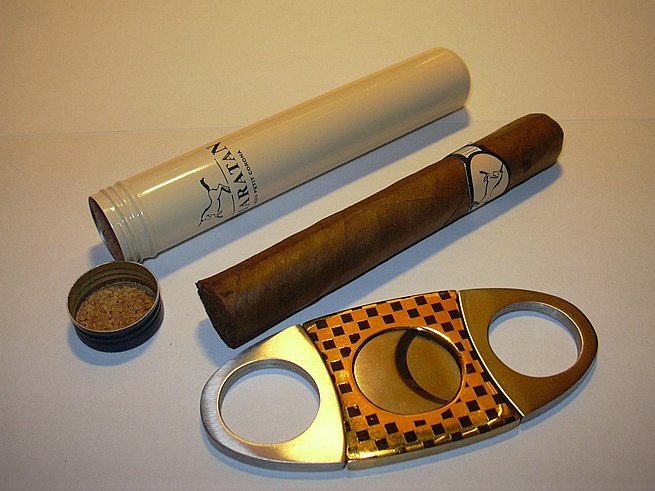
Main Difference
The main difference between Cigar and Cigarette is that the Cigar is a tightly-rolled bundle of tobacco designed to be lit and smoked and Cigarette is a small roll of cut tobacco designed to be smoked.
-
Cigar
A cigar is a rolled bundle of dried and fermented tobacco leaves made to be smoked. They are produced in a wide variety of sizes and shapes. Since the 20th century, almost all cigars are made up of three distinct components: the filler, the binder leaf which holds the filler together, and a wrapper leaf, which is often the best leaf used. Often the cigar will have a band printed with the cigar manufacturer’s logo. Modern cigars often come with 2 bands, especially Cuban Cigar bands, showing Limited Edition (Edicion Limitada) bands displaying the year of production.
Cigar tobacco is grown in significant quantities primarily in Central America and the islands of the Caribbean, including Cuba, the Dominican Republic, Haiti, Honduras, Mexico, Ecuador, Nicaragua, Guatemala, Panama, and Puerto Rico; it is also produced in the Eastern United States, the Mediterranean countries of Italy and Spain (in the Canary Islands), and in Indonesia and the Philippines of Southeast Asia.
The origins of cigar smoking are still unknown. A Guatemalan ceramic pot dating back to the tenth century features Mayan smoking tobacco leaves tied together with a string.
Regular cigar smoking is known to carry serious health risks including increased danger of various types of cancer and cardiovascular illnesses.
-
Cigarette
A cigarette, also known colloquially as a fag in British English, is a narrow cylinder containing psychoactive material, usually tobacco, that is rolled into thin paper for smoking. Most cigarettes contain a “reconstituted tobacco” product known as “sheet”, which consists of “recycled [tobacco] stems, stalks, scraps, collected dust, and floor sweepings”, to which are added glue, chemicals and fillers; the product is then sprayed with nicotine that was extracted from the tobacco scraps, and shaped into curls. The cigarette is ignited at one end, causing it to smolder; the resulting smoke is orally inhaled via the opposite end. Most modern cigarettes are filtered, although this does not decrease health risks associated with smoking. Cigarette manufacturers have described cigarettes as a drug administration system for the delivery of nicotine in acceptable and attractive form. Cigarettes are addictive (because of nicotine) and cause cancer, chronic obstructive pulmonary disease, heart disease, and other health problems.
The term cigarette, as commonly used, refers to a tobacco cigarette but is sometimes used to refer to other substances, such as a cannabis cigarette. A cigarette is distinguished from a cigar by its usually smaller size, use of processed leaf, and paper wrapping, which is typically white. Cigar wrappers are typically composed of tobacco leaf or paper dipped in tobacco extract.
Smoking rates have generally declined in the developed world, but continue to rise in developing nations. Cigarette smoking is associated with serious health risks; nicotine is also highly addictive. About half of cigarette smokers die of tobacco-related disease and lose on average 14 years of life. Cigarettes cause between 1 and 1.4 deaths per million smoked, with a lag period of roughly 25 years. According to Dr. Robert Proctor, the 6 trillion cigarettes smoked in 1990 caused around 1 death every 5 seconds in 2015.Cigarette use by pregnant women has also been shown to cause birth defects, including low birth weight, fetal abnormalities, and premature birth. Second-hand smoke from cigarettes causes many of the same health problems as smoking, including cancer, which has led to legislation and policy that has prohibited smoking in many workplaces and public areas. Cigarette smoke contains over 7,000 chemical compounds, including arsenic, formaldehyde, cyanide, lead, nicotine, carbon monoxide, acrolein, and other poisonous substances. Over 70 of these are carcinogenic. Additionally, cigarettes are a frequent source of mortality-associated fires in private homes, which prompted both the European Union and the United States to ban cigarettes that are not fire-standard compliant from 2011 onwards.
-
Cigar (noun)
Tobacco rolled and wrapped with an outer covering of tobacco leaves, intended to be smoked.
-
Cigarette (noun)
Tobacco or other substances, in a thin roll wrapped with paper, intended to be smoked.
-
Cigarette (verb)
To give someone a cigarette, and/or to light one for them.
-
Cigar (noun)
a cylinder of tobacco rolled in tobacco leaves for smoking.
-
Cigarette (noun)
a thin cylinder of finely cut tobacco rolled in paper for smoking.
-
Cigarette (noun)
an object similar to a cigarette containing a narcotic or herbal substance.
